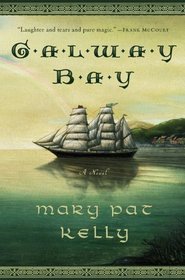Helpful Score: 2
I wanted to like this one more than I did. Ordinarily a generational family saga is exactly what I gravitate towards, especially paired with a nautical element, set in Ireland. But even my unnatural fascination with potatoes couldn't save this novel for me.
The first half of the novel (the Before Times) moved swiftly enough and I found myself caught up in the life of young Honora, so devotedly in love with her sweet husband, Michael. Their courtship flew by, as did the first years of their life together, starting a family, settling down. Throughout, the reader can feel the deep hum of unrest whenever an English landlord showed up. I am no sympathizer with England, believe me, so my frustration grew along with theirs. And by the time the blight hit and the winters froze everything, I think I might have strangled an English person if one were to walk up to me. Injustice always sets me off in a novel (see Kiran Desai's The Inheritance of Loss).
Then something horrible happened and I got really angry and the Before Times were over.
The story never picked up again for me. Had the author injected a little more hope into the second half, as she had throughout the atrocities of the first, I could have really enjoyed it.
The writing seemed fine, if unremarkable. I enjoyed how it was simple etiquette to launch into a story at any time and even if two people were fighting, they had to pause to listen. The Irish value their storytelling. Clearly Frank Delaney was an influence here. Fado...
The half star is for the lovely weaving of Irish words throughout the story. Simply fascinating where "So long!" and "Say Uncle!" came from. I appreciated, also, the level of detail the author put in, to make this work so well as an historical novel.
The first half of the novel (the Before Times) moved swiftly enough and I found myself caught up in the life of young Honora, so devotedly in love with her sweet husband, Michael. Their courtship flew by, as did the first years of their life together, starting a family, settling down. Throughout, the reader can feel the deep hum of unrest whenever an English landlord showed up. I am no sympathizer with England, believe me, so my frustration grew along with theirs. And by the time the blight hit and the winters froze everything, I think I might have strangled an English person if one were to walk up to me. Injustice always sets me off in a novel (see Kiran Desai's The Inheritance of Loss).
Then something horrible happened and I got really angry and the Before Times were over.
The story never picked up again for me. Had the author injected a little more hope into the second half, as she had throughout the atrocities of the first, I could have really enjoyed it.
The writing seemed fine, if unremarkable. I enjoyed how it was simple etiquette to launch into a story at any time and even if two people were fighting, they had to pause to listen. The Irish value their storytelling. Clearly Frank Delaney was an influence here. Fado...
The half star is for the lovely weaving of Irish words throughout the story. Simply fascinating where "So long!" and "Say Uncle!" came from. I appreciated, also, the level of detail the author put in, to make this work so well as an historical novel.




